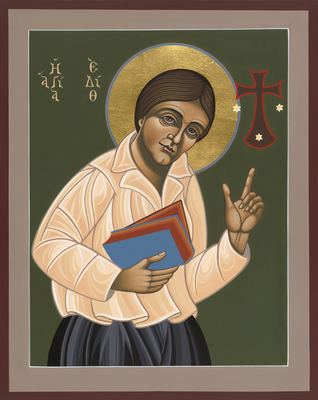Sale on canvas prints! Use code ABCXYZ at checkout for a special discount!

St Edith Stein : Patroness of Europe
“Let go of your plans. The first hour of your morning belongs to God.
Tackle the day’s work that He charges you with, and He will give you
the power to accomplish it.”
Edith Stein (St Teresa Benedicta of the Cross)*12 October 1891 - 9 August 1942
The saints have always been a huge part of my life, since I was very young, maybe 5 years old, when someone gave me the 4 little books by Fr Daniel Lord, SJ, called “Little Lives of the Saints.” At age 19 I entered the Jesuit Novitiate In Florissant, Missouri, on September 1, 1968. It might have been the next morning , I went outside into the Jesuit Cemetery to find Fr Lord’s grave and I thanked him for my vocation. People often tell me I know a lot about the saints, but truthfully, I just know the major feast days and a few of the thousands of Irish, Russian and Greek saints, thanks to my 31 years as an iconographer. Someone like my friend, publisher of Orbis Books and author, Robert Ellsberg...he really knows the saints ! His brilliant books on the saints are informative and wonderful. You could spend that “first hour in the morning” reading one of his many books about the saint of the day. The saints come to you to give you something and the one that has the power to almost instantly calm me down, is Edith Stein, the martyr of Auschwitz. So I keep her picture on my “prayer wall” and look at her every day. Around this time every year, it becomes the season of Edith and Franz Jagerstatter (see the new exquisitely heartbreaking film by Terrence Malick, “A Hidden Life”) who died on the exact same day, 9 August, one year after Edith and Rosa.
I won’t be able to tell Edith’s story here, but you can easily look her up on the internet. I like everything about her, but especially the fact she had to fuse together so many contradictory parts of herself into one. She was a Jewish woman born on Yom Kippur, a temporary atheist, a philosopher, writer, feminist, Catholic convert and finally a Carmelite nun and martyr. She managed to keep all these parts in tension without dropping a single one ... except of course atheism. And I love her humor. One of the Carmelites who knew her well, said she’d be the first one to laugh out loud if you told her she was going to be a saint. She knew she had a destiny, a vocation, but only began to grasp what it was when Hitler came into power in Germany. As she and her sister Rosa, (not a convert but was staying at the Convent when the SS guards arrived to take them away) were put on the train to Auschwitz, Edith dropped a postcard out the train widow, which actually did get to the Carmelites, that simply said “Going east...” Others on the same train had no idea of where they were headed but Edith knew. Her “calming power” was never as powerful, I think, as that day of arrival at Auschwitz, 9 August 1942. A survivor tells the story of mothers rocking in the fetal position, incapacitated by sheer incomprehensible terror and shock; their children scattered all over and terrified too. Edith sought out the children and for the few hours they had left, combed their hair, held them and gently calmed them.
Another dear friend and also a brilliant theologian and author, Christopher Pramuk introduced me to the work of Melissa Raphael a professor of Jewish Theology at the University of Gloucestershire, UK who also teaches Jewish thought at Leo Baeck College in London. She has written a book which I’m reading now and I cannot begin to say enough about it : “The Female Face of God in Auschwitz.” The stories she tells about the extraordinary compassionate strength of many women and the way they supported one another are tragic, beautiful and unforgettable. It is a deeply reverent book, one that automatically brings you into prayerful meditation; as accounts of any martyrs do naturally. The description from Amazon books says, “The dominant theme of post-Holocaust Jewish Theology has been that of the temporary hiddenness of God, interpreted as either a divine mystery or, more commonly, as God’s deferral to human freedom. But traditional Judaic obligations of female presence, together with the traditional image of the Shekhinah as a figure of God’s ‘femaleness’ accompanying Israel into exile, (in the Hebrew Scriptures such as Exodus, Numbers, etc..) seem to contradict such theologies of absence. “The Female Face of God in Auschwitz,” the first full-length feminist theology of the Holocaust, argues that the patriarchal bias of post-Holocaust theology becomes fully apparent only when women’s experiences and priorities are brought into historical light. Building upon the published testimonies of four women imprisoned at Auschwitz-Birkenau...it considers women’s distinct experiences of the holy in relation to God’s perceived presence and absence in the camps. God’s face, says Melissa Raphael, was not hidden in Auschwitz, but intimately revealed in the female face turned towards the other as a refractive image of God, especially in the moral protest made visible through material and spiritual care for the assaulted other.”
“O my God, fill my soul with holy joy, courage, and strength to serve You.
Enkindle Your love in me and then walk with me along the next stretch of road
before me. I do not see very far ahead, but when I have arrived where the horizon now closes down, a new prospect will open before me, and I shall meet it with peace. Amen”
St Edith Stein
Fr Bill McNichols 💮 Mid-Summer 2021